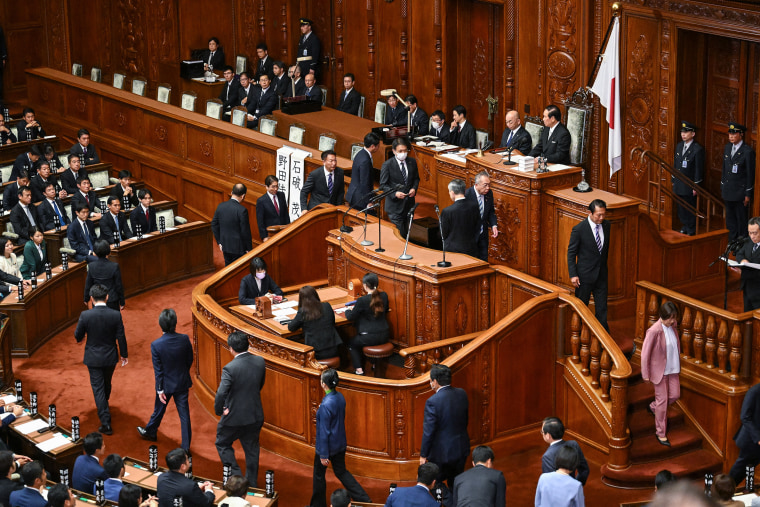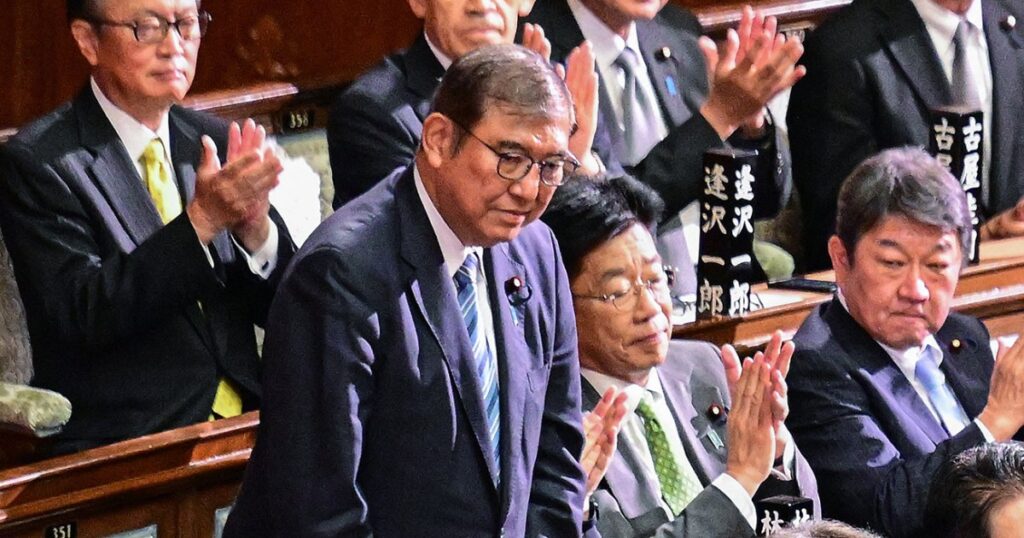TOKYO — Japanese lawmakers on Monday voted to keep embattled Shigeru Ishiba as prime minister despite the disastrous performance of his long-term government in last month’s parliamentary elections.
Ishiba, 67, was sworn in as prime minister of the major U.S. ally on October 1, shortly after winning the leadership election for the Liberal Democratic Party (LDP), which has ruled Japan almost uninterrupted since World War II. . But his future role has been called into question after his party suffered its worst election defeat in more than a decade and lost support from voters angered by corruption scandals and rising costs of living.
As a result, the Liberal Democratic Party lost its majority in parliament, but Mr. Ishiba was still able to maintain power, and he will rule with a minority government. He must now face the challenge of a weakened and unpopular ruling party, as well as a possible change in approach from Washington after President-elect Donald Trump’s victory.
Ishiba, an outspoken former defense minister, received 221 votes, and Yoshihiko Noda of the opposition Constitutional Democratic Party received 160 votes. The other candidates received a total of 84 votes.
Ishiba said Saturday at an annual review ceremony at a Japanese military base outside Tokyo that Japan, the world’s fourth-largest economy, “faces the most severe and complex security environment since the war.” , vowed to strengthen Japan’s diplomatic efforts. Also its defensive ability.
He cited violations of Japan’s airspace by China and Russia in August and September, as well as the entry of a Chinese aircraft carrier into Japan’s contiguous zone for the first time in September. Countries around the world, including Japan, are also concerned about the acceleration of weapons tests by nuclear-armed North Korea, which signed a mutual defense pact with Russia this year.

Ishiba said the Japan-U.S. alliance is the “foundation” of Japan’s diplomacy and security, and said in a phone conversation after Trump won the last election that he and Trump would “take the Japan-U.S. alliance to new heights.” “We will work together to achieve this goal,” he said. week.
Koichi Nakano, a visiting fellow at Harvard University’s Weatherhead Program on Japan-U.S. Relations, told NBC News in an interview before last week’s U.S. presidential election that there were many concerns in Japan as Trump became president for a second term.
Many Japanese officials expect Trump to be “more outspokenly anti-China” and that Japan will “somehow miraculously get out of trouble,” he said. But he said they had a “misunderstanding” about the U.S. president-elect, despite his famous friendship with Japan’s late Prime Minister Shinzo Abe.
Nakano said President Trump’s tariff threat should be taken “very seriously” given Japan’s growing trade surplus with the United States, its largest export destination. He said they could have “catastrophic” consequences for a country already struggling with rising costs and a “very weak” currency.
David Boling, director of Japan and Asia trade at the New York-based consulting firm Eurasia Group, said at a press conference after the U.S. presidential election last week that Japan expected pressure from the Trump administration to increase defense spending. said.
Japan has already pledged to double its defense spending to 2% of gross domestic product by 2027, but “that probably won’t be enough to satisfy President Trump,” Boling said.
Japan’s Nippon Steel Corp.’s $14.9 billion takeover bid to acquire Pittsburgh-based U.S. Steel also faces strong U.S. opposition. President Joe Biden, President Trump and his Democratic rival in the U.S. presidential election, Vice President Kamala Harris, had all expressed opposition to the deal.
“It looks pretty dead,” Bowling said. He said the only way to revive the company is for Nippon Steel to reach an agreement with the United Steelworkers, a Pittsburgh-based union that has vocally opposed the deal.
Nippon Steel Vice Chairman Takahiro Mori told reporters last week that he hopes to complete the deal by the end of the year, before President Trump takes office.
Much of this is due to interpersonal relationships. Prime Minister Abe has been “very skillful” in dealing with Trump, but Ishiba has a different personality, Boring said.
Mr. Ishiba said, “I’m more of the type to think deeply.” “He’s known as someone with a lot of defense knowledge, but I don’t know if that will go over that well with President Trump.”
Boling said there are several things working in Japan’s favor. While it is unlikely to be at the top of President Trump’s “trade goals list,” it would be good to remind him that it is the largest source of foreign direct investment to the United States.
The United States also noted that “Japan has become a truly indispensable ally in the Indo-Pacific region, and if the U.S. government is to have an effective economic and national security policy toward China, we must “We recognize that there is a real need for this,” Boling said. Said.
Still, President Trump’s second term could be difficult for Japan, where many see him as a “ticking time bomb” in terms of security and the global economy, said Temple University’s Asia Studies Japan Campus.・History professor Jeff Kingston said in an interview. before the US presidential election.
“I certainly don’t think Mr. Trump is a welcome partner. They saw how bad it was last time,” Kingston said. “But Japan will adjust because the security environment is very dangerous and we need the U.S. security umbrella.”
Arata Yamamoto reported from Tokyo, and Jennifer Jett and Peter Guo reported from Hong Kong.



